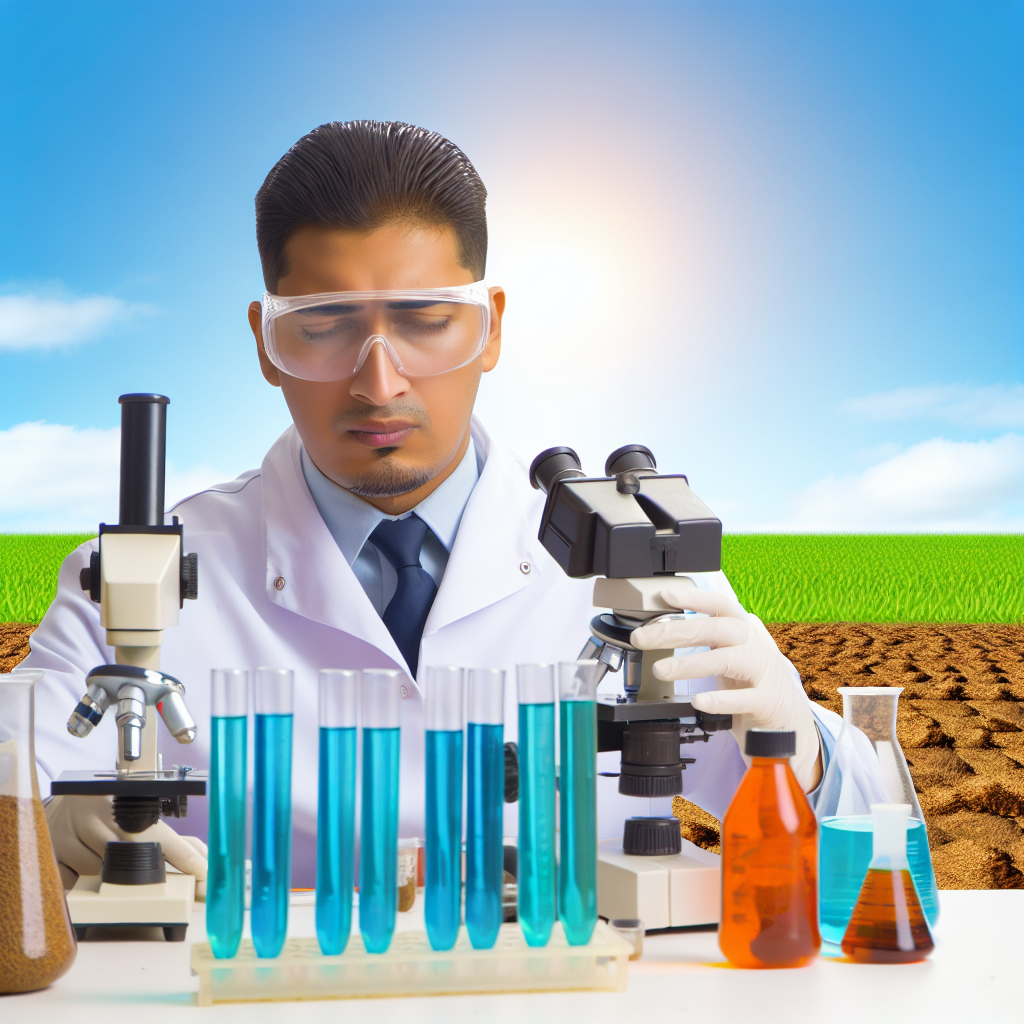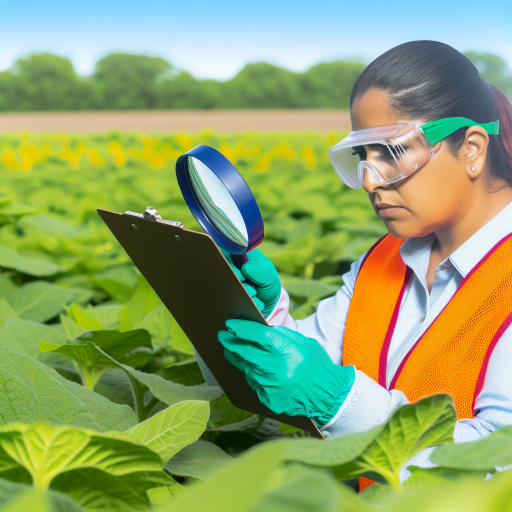Introduction
Pesticides are chemicals used to control pests and increase crop yields.
They play a vital role in agriculture by protecting crops from harmful insects.
Pesticides help farmers maintain food production by preventing crop damage.
They are essential for ensuring food security and supply for the growing population.
Without pesticides, farmers would struggle to meet the demand for food.
While pesticides have benefits, they also pose environmental and health risks.
Understanding the impact of pesticides on the environment is crucial for sustainable agriculture.
By exploring solutions, we can mitigate the negative effects of pesticides on ecosystems.
Impact of Pesticides on the Environment
Pesticides used in agricultural practices can leach into the soil and contaminate groundwater sources.
Pollution of Soil and Water due to Runoff
Bees and other beneficial insects are essential for pollination, but pesticides can harm these important creatures.
Harmful Effects on Non-Target Organisms
Pesticides can bioaccumulate in the food chain, leading to health risks for humans who consume contaminated products.
Solutions to Minimize Pesticide Impact
Use of Integrated Pest Management (IPM)
IPM combines various pest control methods to reduce the reliance on chemical pesticides.
Promotion of Organic Farming
Organic farming practices eliminate the use of synthetic pesticides, promoting a healthier environment.
Educating Farmers on Proper Pesticide Use
Training programs can help farmers understand the correct application of pesticides to minimize environmental impact.
Implementing Buffer Zones
Creating buffer zones around water bodies can help reduce pesticide runoff into aquatic ecosystems.
Development of Biopesticides
Biopesticides derived from natural sources offer effective pest control while minimizing environmental harm.
Supporting Research on Alternative Pest Control Methods
Investing in research for innovative and sustainable pest control methods can reduce dependence on harmful pesticides.
Protecting the Environment with Sustainable Practices
The impact of pesticides on the environment is significant, but there are solutions available to minimize these effects.
By implementing sustainable practices and promoting eco-friendly pest control methods, we can protect our environment for future generations.
Transform Your Career Today
Unlock a personalized career strategy that drives real results. Get tailored advice and a roadmap designed just for you.
Start NowImpact of Pesticides on Biodiversity
Pesticides, while essential for agriculture, have a detrimental impact on biodiversity.
The use of these chemicals disrupts ecosystems and leads to a loss of biodiversity.
Disruption of Ecosystems and Loss of Biodiversity:
- Pesticides can harm non-target species, such as beneficial insects, soil microbes, and aquatic organisms.
- These chemicals disrupt the natural balance of ecosystems, leading to a decline in biodiversity.
- Loss of biodiversity can have cascading effects, impacting the food chain and overall ecosystem health.
- Species that serve essential roles in ecosystems, such as pollinators, are particularly vulnerable to pesticide exposure.
- Without these key species, ecosystems struggle to function properly, leading to further declines in biodiversity.
Reduction in Populations of Pollinators and Other Beneficial Species:
- Pesticides have been linked to the decline of pollinator populations, such as bees, butterflies, and other essential species.
- Without pollinators, many plants cannot reproduce, leading to a decrease in plant diversity and ecosystem stability.
- Other beneficial species, such as predators of pests, are also affected by pesticide use, disrupting natural pest control mechanisms.
- Overall, the loss of these species can have far-reaching consequences for ecosystem health and functioning.
Long-Term Effects on the Balance of Ecosystems:
- The long-term use of pesticides can have lasting effects on the balance of ecosystems, altering their structure and function.
- Repeated exposure to pesticides can result in reduced genetic diversity within populations, making them more vulnerable to environmental changes.
- Ecosystems may become less resilient to disturbances, such as climate change or invasive species, due to the effects of pesticides.
- Ultimately, the overuse of pesticides can lead to a decrease in overall biodiversity, threatening the stability of ecosystems.
The impact of pesticides on biodiversity is a serious concern that must be addressed.
By implementing sustainable farming practices, reducing pesticide use, and promoting biodiversity-friendly agriculture, we can mitigate the negative effects of pesticides on ecosystems and protect biodiversity for future generations.
Gain More Insights: Agricultural Economists: Tools and Technologies Used
Integrated Pest Management (IPM) practices to reduce pesticide use
Implementing IPM strategies involves using a combination of biological, cultural, physical, and chemical controls to manage pests effectively.
Use of organic pesticides and natural alternatives
Organic pesticides are derived from natural sources like plants, bacteria, and minerals, which are less harmful to the environment.
Buffer zones and proper pesticide application techniques to minimize environmental impact
Creating buffer zones around sensitive areas like water bodies can prevent pesticide runoff.
Using precision application methods can minimize drift.
Adopting sustainable agricultural practices and promoting biodiversity can help reduce the reliance on harmful pesticides.
It is crucial for farmers, policymakers, and consumers to work together towards a more environmentally friendly approach to pest management.
By implementing these solutions and promoting awareness about the impact of pesticides on the environment, we can protect our ecosystems.
This ensures a healthier future for generations to come.
Gain More Insights: Preparing for a Career in Agricultural Entomology
Regulations and Policies
Regulations and policies play a crucial role in ensuring that pesticides are used responsibly.
Let’s take a closer look at the existing regulations on pesticide use and evaluate their effectiveness in protecting the environment.
Overview of Existing Regulations on Pesticide Use
Several regulations govern the use of pesticides to minimize their environmental impact.
These regulations cover various aspects of pesticide use, including registration, labeling, storage, application, and disposal.
- Registration: Before a pesticide can be sold or used, it must be registered with the Environmental Protection Agency (EPA) to ensure that it meets safety and efficacy standards.
- Labeling: Pesticide labels contain important information on how to safely use the product, including dosage, application instructions, and safety precautions.
- Storage: Pesticides must be stored in a secure location to prevent leaks, spills, or contamination of water sources.
- Application: Pesticides should only be applied by certified professionals following strict guidelines to minimize environmental exposure.
- Disposal: Proper disposal of leftover pesticides is essential to prevent contamination of soil, water, and wildlife.
Evaluation of the Effectiveness of Current Policies
While existing regulations are a step in the right direction, there are areas for improvements to protect the environment from harmful pesticides.
- Lack of enforcement: Inadequate enforcement of regulations can lead to improper use and disposal of pesticides, resulting in environmental contamination.
- Weak monitoring: Limited monitoring of pesticide residues in soil, water, and air makes it challenging to assess environmental damage.
- Insufficient penalties: The penalties for violating pesticide regulations may not deter irresponsible use of these chemicals.
- Long-term effects: Current policies may not fully consider the long-term cumulative effects of pesticide exposure on ecosystems and human health.
Suggestions for Stronger Regulations
To address shortcomings and better safeguard the environment, here are some suggestions for stronger regulations on pesticide use:
Transform Your Career Today
Unlock a personalized career strategy that drives real results. Get tailored advice and a roadmap designed just for you.
Start Now- Enhanced monitoring: Implement regular monitoring programs to track pesticide residues in soil, water, and air to detect contamination early.
- Increased penalties: Enforce stricter penalties for violations of pesticide regulations to deter non-compliance and irresponsible pesticide use.
- Education and outreach: Offer training and educational programs to farmers, pesticide applicators, and the general public on safe pesticide use practices.
- Alternative solutions: Promote the use of integrated pest management (IPM) strategies and organic farming practices as alternatives to chemical pesticides.
- Research and innovation: Invest in research to develop safer and more environmentally-friendly pesticide alternatives to reduce reliance on harmful chemicals.
There is always room for improvement in regulations and policies to better protect the environment.
Implementing stronger regulations and promoting sustainable practices ensures a healthier and more sustainable future for our planet.
Delve into the Subject: Extension Agents and Precision Agriculture

Importance of Raising Awareness About the Impact of Pesticides
Community involvement and education play a crucial role in raising awareness about the harmful effects of pesticides on the environment.
By educating individuals about the risks associated with pesticide use, we can empower them to make informed choices that promote environmental sustainability.
Through community outreach programs, workshops, and educational campaigns, we can highlight the negative impact of pesticides on ecosystems, wildlife, and human health.
This information can encourage individuals to reconsider their reliance on chemical pesticides and explore safer, eco-friendly alternatives.
By engaging with local communities, we can foster a sense of collective responsibility towards protecting the environment from the harmful effects of pesticides.
This shared understanding can lead to collaborative efforts to reduce pesticide use and minimize its negative repercussions on the ecosystem.
When community members are informed about the environmental consequences of pesticide use, they are more likely to advocate for policies and practices that promote sustainable agriculture.
Education empowers individuals to become vocal proponents of organic farming methods and integrated pest management strategies.
Promoting Sustainable Agriculture Practices in Local Communities
One of the key objectives of community involvement and education is to promote sustainable agriculture practices within local communities.
By emphasizing the importance of sustainable farming techniques, we can reduce the reliance on chemical pesticides and protect the environment.
Through educational initiatives and training programs, we can equip farmers with the knowledge and skills needed to transition towards sustainable agricultural practices.
This includes promoting crop rotation, natural pest control methods, and soil conservation techniques that contribute to long-term environmental sustainability.
By encouraging the adoption of sustainable agriculture practices, we can enhance soil health, biodiversity, and water quality in local ecosystems.
This approach not only benefits the environment but also ensures the long-term viability of agricultural production for future generations.
Community-led initiatives that focus on sustainable agriculture can create a ripple effect, inspiring neighboring farms and communities to adopt similar practices.
This collective effort towards sustainability can lead to a significant reduction in pesticide usage and its detrimental impact on the environment.
Encouraging the Adoption of Eco-Friendly Alternatives to Pesticides
Community involvement and education can also play a significant role in promoting the adoption of eco-friendly alternatives to chemical pesticides.
Transform Your Career Today
Unlock a personalized career strategy that drives real results. Get tailored advice and a roadmap designed just for you.
Start NowBy showcasing the effectiveness of natural pest control methods, we can encourage individuals to shift towards more sustainable pest management practices.
Educational workshops and demonstrations can introduce community members to alternative pest control strategies such as biological control, physical barriers, and companion planting.
These methods offer effective solutions for pest management without the negative environmental consequences associated with chemical pesticides.
By highlighting the benefits of eco-friendly alternatives, we can dispel misconceptions about their efficacy and showcase their potential to protect crops without harming the environment.
This knowledge empowers individuals to make conscious choices that prioritize environmental sustainability in agricultural practices.
Through dedicated efforts to educate and engage with local communities, we can create a culture of sustainability that values the use of eco-friendly alternatives to pesticides.
By collectively embracing these practices, we can work towards a healthier environment and a more sustainable future for all.
Uncover the Details: Biotechnology Specialist Salary and Job Outlook
Role of Pesticide Companies in Promoting Environmentally Safe Products
Pesticide companies play a vital role in promoting environmentally safe products.
They invest in research and development of sustainable pest control methods.
These companies need to prioritize the development of products that are effective in controlling pests while minimizing their impact on the environment.
One way that pesticide companies can promote environmentally safe products is by investing in research and development.
By dedicating resources to finding new, sustainable pest control methods, companies can help reduce the use of harmful chemicals.
Investment in Research and Development of Sustainable Pest Control Methods
Investing in research and development of sustainable pest control methods is essential for pesticide companies to remain competitive.
By continuously improving their products and finding new ways to control pests, companies can attract environmentally conscious customers.
Moreover, pesticide companies can also engage in corporate social responsibility initiatives to support environmental conservation efforts.
Corporate Social Responsibility Initiatives to Support Environmental Conservation Efforts
By engaging in corporate social responsibility initiatives, pesticide companies can demonstrate their commitment to sustainability.
These initiatives can help build trust with consumers and showcase the company’s dedication to protecting the environment.
Pesticide companies have a significant role to play in promoting environmentally safe products and supporting conservation efforts.
By investing in research and development of sustainable pest control methods, these companies can contribute to a healthier environment.
Transform Your Career Today
Unlock a personalized career strategy that drives real results. Get tailored advice and a roadmap designed just for you.
Start NowEnvironmental Impact of Pesticides
The negative impact of pesticides on the environment is undeniable.
This issue leads to soil degradation, water pollution, and harms biodiversity.
It is crucial to shift towards implementing sustainable solutions in agriculture and pest control.
Using organic and natural alternatives can help minimize the detrimental effects of pesticides.
We must act now to protect our environment for future generations.
Individuals, communities, and industries must come together and take responsibility for their actions.
Raising awareness and educating others are essential.
Promoting sustainable practices creates a healthier environment for all.
Let’s work together to make a positive impact on our planet.
Additional Resources
Sources and Solutions: Agriculture | US EPA
[E-Books for Sale]
The Big Book of 500 High-Paying Jobs in America: Unlock Your Earning Potential
$19.99 • 500 High-Paying Jobs • 330 pages
Explore 500 high-paying jobs in America and learn how to boost your career, earn more, and achieve success!
See All 500 High-Paying Jobs of this E-Book
1001 Professions Without a Degree: High-Paying American Jobs You Can Start Now
$19.99 • 1001 Professions Without a Degree • 174 pages
Discover 1001 high-paying jobs without a degree! Unlock career tips, skills, and success strategies for just $19.99!




